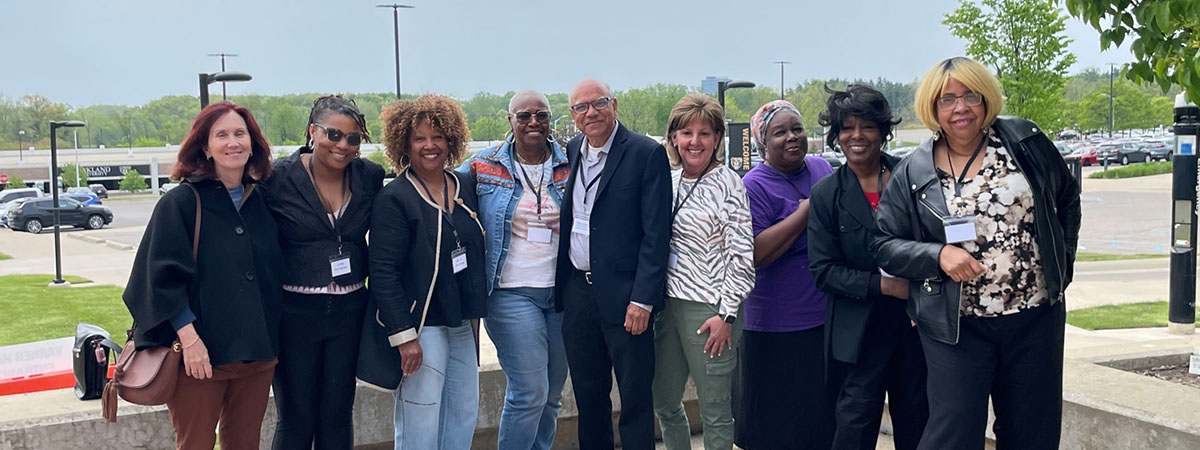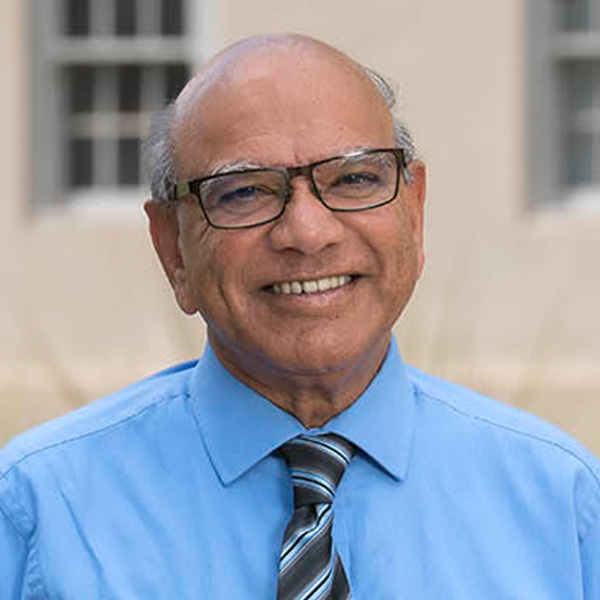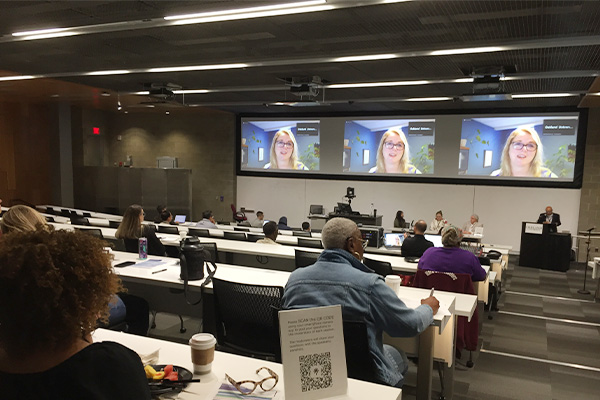Students Learn to Use Digital Tools for Public Health in Collaboration with Community Health Providers

Photo above: Dr. Mohan Tanniru with staff and partners from Project Healthy Community.
As digital tools become increasingly common and useful to address community health needs, Dr. Mohan Tanniru provides applied practice experiences with community health providers to train his students for success as future public health professionals.
In the span of a few decades, technology has progressed at an astonishing pace. We live on our computers, we depend on our smartphones, we meet each other on Zoom. The very first iPhone was introduced in 2007, and our lives are now transformed.

Mohan Tanniru, PhD
This pace of this transformation has been disruptive, and presents hazards as well as opportunities, but it is the world in which we live. Understanding how to harness technology to achieve public health goals is vital as we move forward, especially for poor and underserved communities. That is where the public health course Population Health in the Digital Age, taught by Mohan Tanniru, PhD, meets our moment in public health.
Dr. Tanniru, an adjunct professor in the Department of Public Health Practice, Policy, and Translational Research at the Phoenix Campus of the Zuckerman College of Public Health, has a wealth of experience in the use of applied technology and management information systems. He gained this experience in the business world, and he now brings it to focus on population-level health challenges. His Population Health in the Digital Age (PHDA) course introduces students to existing technologies that are used to improve community health outcomes, and additionally prompts them to think creatively about ways that technology can help to gather important data and guide public health programs.
Based on experience and longstanding partnerships, Mohan realized as he was developing the PHDA course that an applied learning experience would greatly benefit students while simultaneously helping community health services providers. Before coming to the University of Arizona, Mohan was a professor of Management Information Systems at Oakland University near Detroit. Building on the relationships he had already developed in Michigan, Mohan reached out to Henry Ford Health, Trinity Health Michigan, Corewell Health, Project Healthy Community (a nonprofit focused on wellness education), and HOPE (a non-profit homeless population shelter) with an invitation to work together. Both leaders and employees at those organizations already knew Mohan, admired his collaborative approach, and were eager to partner with his students.
Collaboration with Community Health Partners
One of Mohan’s former Oakland University students, David Bobryk, was hired by Trinity Health Oakland Hospital after he completed an internship there. He now works as Director of Health Informatics and Analytics for Trinity Health Michigan. Inspired by Mohan's work with students through projects, David was eager to work with students in public health. Together with his colleague Maddy Kovach, a Health Informatics Specialist, David collaborated with two cohorts of Dr. Tanniru’s students.
The first cohort tackled an assessment of the MyChart patient portal, evaluating the experience of different population demographics. They identified barriers to adoption of the portal, and helped the hospital refine its marketing efforts for the MyChart platform. The collaborative process was rewarding for the students and informative for the hospital.
The second cohort focused on the MyChart bedside platform, a digital tablet used by hospital patients and family members to track the care schedule and process. The students worked remotely in collaboration with an on-site nurse to survey patients, and their evaluation helped to increase adoption rates and provide insights for implementation. David and Maddy both appreciated working with the students. They shared the survey results at the Trinity Executive Leadership meeting. Ultimately the student project helped drive decision making for the larger organization to better meet patient needs.

Participants at the hybrid community health workshop in May 2023
Of course, student collaborations do not always go smoothly. Project Healthy Community (PHC) had a mixed record with student engagement (one successful and another not so much) as they worked with groups of PHDA students on two different projects. One project involved a literature review of research related to wellness programs, and the other prepared surveys to learn about the health goals of the population PHC serves. Karen Rubenfire, the Chief Operating Officer and Sasha Kersey, a Senior Nutrition Educator for PHC, explained that they were working to incorporate a health tracker app into PHC’s Family Wellness Program and integrating students into the process was at times difficult. Despite this setback, representatives from PHC are still eager to work with Mohan and they found inspiration at his recent May 2023 workshop titled Community Engagement to Address Population Health. The workshop brought together community health providers and practitioners to share ideas and challenges related to technology solutions for community health needs.
In contrast, Praharsha Sista, one of Mohan’s former students in the PHDA course who worked with PHC as part of an earlier cohort, had a very positive experience. She and her group worked to evaluate a nutrition and movement coaching program for older African American adults. This program used a smart phone app to monitor progress. While working with PHC, Praharsha also collaborated with a team working on a similar project from a University in China, which was a partner in the Digital Health Academy, directed by Mohan. Praharsha was able to compare and contrast the perspectives of the teams from these the two projects, conduct data analysis, gain insights, and make recommendations in her final presentation.
“It was an amazing experience, and I learned so much about health disparities,” said Praharsha. “It was rewarding to work with the community group, using what I learned in class to help real people. I love working with Dr. Tanniru.” In fact, Praharsha was so motivated by the experience that she continued to work with Mohan on data analysis projects, and she now plans to pursue a combined MD and MPH degree.

As we face emerging challenges in public health, we must take advantage of digital tools to improve community health and wellness, and the skills and experience that Dr. Tanniru brings in this area are so valuable for our students.
Dean Hakim

Dana Parke, Program Manager for Clinical and Social Health Integration at Henry Ford Health in Michigan, works on population health with a focus on the connection between housing and health. Dana has partnered twice with Mohan's students, and both experiences were rewarding for everyone involved. In the first project, Dana guided students to research potential home repairs and modifications that would enhance safety for older adults. Based on a literature review, the students concluded that motion-sensor lights near stairways and in hallways could significantly prevent falls, a low-cost improvement with substantial benefits. Following this guidance, Henry Ford Health partnered with Habitat for Humanity Detroit to install more than 200 motion-sensor lights in the homes of over 100 older adults, among other home repairs to prevent falls.
The second project focused on Henry Ford Health’s strong partnership with Ruth Ellis Center, a social services agency that serves LGBTQ+ young people experiencing homelessness and housing insecurity. Dana was working to operationalize a new Health & Wellness Center at the Ruth Ellis Clairmount Center permanent supportive housing development. Dana asked the students to conduct a literature review on best practices for providing healthcare to LGBTQ+ youth, including any lessons on virtual care, to help inform the design of the clinical care model. Both student projects underscored the practical, real-world impact of the approach Mohan teaches in his course and the benefits of an applied practice learning experience for students.
In the span of just a few years, enrollment in Dr. Tanniru’s Population Health in the Digital Age course has grown from 4 students in 2020 to 42 in the most recent session. As a result, Mohan hopes to find community health organizations in Arizona who would be ready to form partnerships. The potential to improve public health through available and emerging technologies is clear, and the Zuckerman College of Public Health is determined to teach students how to evaluate, implement, and guide the deployment of technology to solve health challenges. Mohan’s work and teaching are crucial parts of this progress, and many of his graduates are already out in the workforce, making a difference, improving peoples’ lives.
“As we face emerging challenges in public health, we must take advantage of digital tools to improve community health and wellness, and the skills and experience that Dr. Tanniru brings in this area are so valuable for our students,” said Iman Hakim, MD, PhD, MPH, dean of the Zuckerman College of Public Health, “We are so fortunate to be working with him. Even better, his partnerships with community health providers enable our students to gain practical, applied learning that will make them better public health professionals.”

